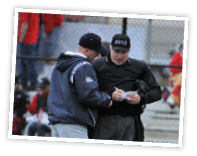
By Mitch Wasserman
For whatever reason, some people believe I already have two strikes against me because I spend time in these two jobs: local government management and baseball. People claim these two professions are nothing alike. I have to disagree because I have been an umpire and in the management profession for more than 30 years.
Any success I have had in either of these two careers may be linked to their similarities and the skills I have used in both.
Why Do Both?
One question I am asked is why I do both, and why anyone would want to be subject to constant criticism, to second-guessing of every move, to heckling, to in-your-face personal discussions, and occasionally, to tantrums. I believe the answer is similar for all of us: It is the passion for what we do and the knowledge that we are making a positive and direct difference.
Whether it is for the short-term enjoyment of a game or for the long-term enrichment of a community, it is a passion for what these professions do that drives people to strap on umpire equipment when its 100 degrees or go to yet another late-night meeting. It is knowing that we can directly and constructively influence outcomes in a fair and positive way using personal skills and knowledge.
Extensive Training and Skills
Both professions require an extensive amount of training and a set of honed skills to do them well. Did you know that in the Major League Baseball rulebook there are more than 100 known inconsistencies with other rules in the same book? How many inconsistencies do you think there are in your local codes?
An important skill to have in both professions is knowing just how and when to deal with these inconsistencies or ambiguities, and that everything we face is not always black or white.
When you are skilled in these professions you also know the associated rules, interpreting them and using them for the benefit of all. Do you know how many different ways a pitcher can balk in baseball? (Answer: There are at least 19 different ways for a pitcher to balk in professional baseball.)
Do you know how to change the zoning next to a residential property for a development that will benefit the entire community? (Answer: Walk the developer and make a pitch to the neighborhood association.)
Both professions need what umpires describe as an accomplished set of mechanics to communicate well. A good umpire has three different out/safe calls that are used depending on the intensity of the call and the need to “sell the call.” A good manager also knows how and when to differ her or his management style.
The capacity to make decisions within pressure situations and to cope with stress is a necessary skill for both professions. All managers know we work in a fishbowl with residents looking over our shoulders. In umpiring, folks are literally sitting right behind you.
Managers and umpires must possess the skills necessary to cope with this pressure, process the information available, and still make good decisions. Both also need the ability to make split-second and tough decisions with which not everyone will agree.
I haven’t counted the exact number but during the course of a typical city management day, I need to make numerous decisions, some tougher than others. In each nine-inning ballgame, there will be the need to make more than 350 ball/strike decisions and more than 54 out/safe calls. Often, these are split-second or multiple decisions within one play that require concentration and judgment.
Both managers and umpires need the skills to diffuse hostile situations. A fun difference is that an umpire has the ability to toss someone out of the game. Ever wish you had that tool as a manager without having to deal with unions, progressive discipline, or legal procedures?
Rewards of the Job
Some believe that management and umpiring are thankless jobs. I am not convinced that a thank you is what keeps individuals in these professions coming back. You bet there are challenges and stress and decisions that will not be universally accepted; however, the thrill of hundreds or thousands of people waiting on your call or decision is exciting.
I have umpired a good game when no one even knows I was there. Similarly, I managed a situation well when the results of my efforts are appreciated without the need for any personal accolades. It is all about empowering the players, whether they are in baseball uniforms or in work clothes as part of a council.
Mitch Wasserman is city administrator and umpire, Clyde Hill, Washington (mitch@clydehill.org). The original version of this article was published by the Washington City and County Management Association, Seattle, Washington.New, Reduced Membership Dues
A new, reduced dues rate is available for CAOs/ACAOs, along with additional discounts for those in smaller communities, has been implemented. Learn more and be sure to join or renew today!
